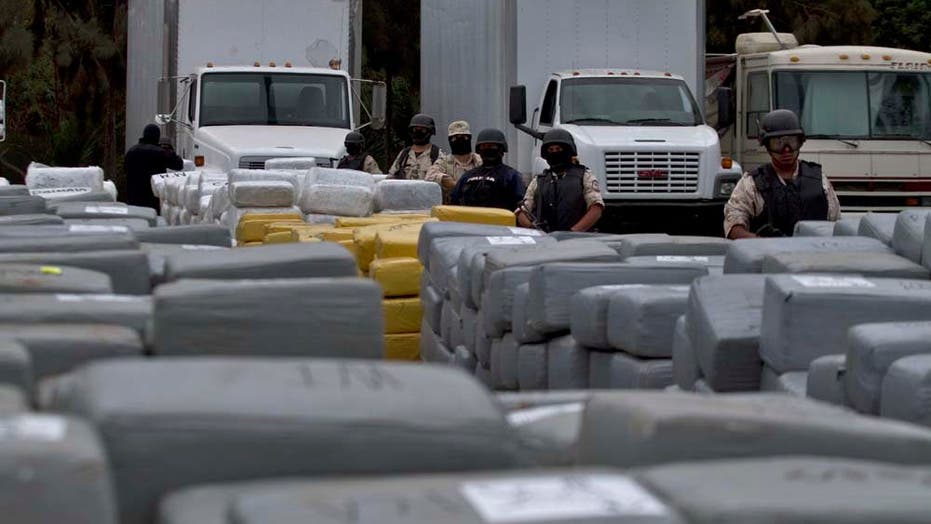U.S. federal agents allegedly cut a deal with the Sinaloa drug cartel that allowed it to traffic tons of narcotics across the border, in exchange for information about rival cartels, according to documents filed in federal court.
The allegations are made by Vicente Zambada-Niebla, a top ranking cartel boss extradited to the U.S. last year on drug charges. He is a close associate of Mexico's most wanted man, Joaquín "El Chapo" Guzmán and the son of Ismael "Mayo" Zambada-García.
Both remain fugitives, in part, because of the deal Zambada-Niebla made with the U.S. Drug Enforcement Agency (DEA), according to a defense motion filed last Friday in the case.
Alvin Michaelson, the Los Angeles attorney representing Zambada- Niebla who wrote the brief, refused comment.
The deal allegedly began with Humberto Loya-Castro, a Sinaloa cartel lawyer who became an informant for the DEA after a drug case against him was dismissed in 2008. According to the motion, the deal was part of a "divide and conquer" strategy, where the U.S. helped finance and arm the Sinaloa cartel through Operation Fast and Furious, in exchange for information that allowed the DEA and the FBI to destroy and dismantle rival Mexican cartels.
- Mexican Drug Cartels, Beware: Pancho Villa’s Relative is on the Job
- Mexico’s Drug War Has U.S. Businesses Reluctant to Open Up Shop
- Mass Graves Reveal Dissension in Cartel, Say Police Sources
- The Marijuana Superhighway Goes to Pot
- Mexico: The World Rally Championship
- They Weren’t On My Unemployment Line
- Guatemala Attributes Massacre to Zetas, Declares State of Emergency
"Under that agreement, the Sinaloa Cartel, through Loya, was to provide information accumulated by Mayo, Chapo and others, against rival Mexican Drug Trafficking Organizations to the United States government. In return, the United States government agreed to dismiss the prosecution of the pending case against Loya, not to interfere with his drug trafficking activities and those of the Sinaloa Cartel, to not actively prosecute him, Chapo, Mayo, and the leadership of the Sinaloa Cartel, and to not apprehend them.”
Zambada- Niebla was arrested in Mexico City in March 2009 and extradited to the U.S. in February to stand trial on narco-trafficking-related charges. The indictment claims he served as the cartel's "logistical coordinator" who oversaw an operation that imported tons of cocaine into the U.S. by jets, buses, rail cars, tractor-trailers and automobiles.
Zambada-Niebla is now being held in solitary confinement in a Chicago jail cell.
The motion claims Mayo, Chapo and Zambada-Niebla routinely passed information through Loya to the DEA that allowed it to make drug busts. In return, the U.S. helped the leaders evade Mexican police.
"In addition, the defense has evidence that from time to time, the leadership of the Sinaloa Cartel was informed by agents of the DEA through Loya that United States government agents and/or Mexican authorities were conducting investigations near the home territories of cartel leaders so that the cartel leaders could take appropriate actions to evade investigators – even though the United States government had indictments, extradition requests, and rewards for the apprehension of Mayo, Chapo, and other alleged leaders, as well as Mr. Zambada-Niebla,” the motion said.
In 2008, "the DEA representative told Mr. Loya-Castro that they wanted to establish a more personal relationship with Mr. Zambada-Niebla so that they could deal with him directly."
So in March 17, 2009, Loya set up a meeting at the Sheraton Hotel in Mexico City with two DEA agents, identified as Manny and David. There, the four men met and Zambada-Niebla claims he received immunity from an indictment out of federal court in Washington D.C.
"There is also evidence that at the hotel, Mr. Zambada-Niebla did accept the agreement and thereafter in reliance on that agreement, provided further information regarding rival drug cartels. Mr. Zambada-Niebla was told that the government agents were satisfied with the information he had provided to them and that arrangements would be made to meet with him again. Mr. Zambada-Niebla then left the meeting. Approximately five hours after the meeting, Mr. Zambada-Niebla was arrested by Mexican authorities. “
Experts who reviewed the document say the U.S. typically has written agreements with paid informants that spell out each other's responsibilities. They doubt Zambada-Niebla had one, although Loya probably did. The defense here is hoping to obtain DEA reports that detail the agencies relationship with the Sinaloa cartel and get the agents on the stand.
In response in court, the U.S. doesn't dispute that Zambada-Niebla may have acted as an informant – only that he did not act with DEA consent.
The DEA and the federal prosecutors in Chicago had no comment.
Former DEA director Karen Tandy told Fox News, "I do not have any knowledge of this and it doesn't sound right from my experience.”
William La Jeunesse is a Fox News Channel reporter for the Los Angeles Bureau.
Follow us on twitter.com/foxnewslatino
Like us at facebook.com/foxnewslatino








































